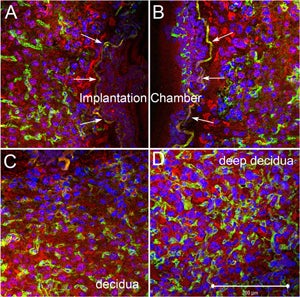 Dr. Carson's laboratory is examining the expression and function of cell surface components that participate in and regulate cellular interactions in developing embryos and various tumor cell models. Following fertilization, embryos develop to a stage at which they acquire the ability to bind to and invade uterine tissue. The multifunctional cell surface mucin glycoprotein, MUC1, plays a key role in controlling access to the apical cell surface during the initial stage of implantation in all species studied to date. In addition, MUC1 is highly overexpressed by many epithelial tumors including those of the uterus, ovaries, breast and pancreas. In normal cells, MUC1 plays an antiadhesive role, lubricates epithelial cell surfaces and provides protection from microbial infection. Carson's Research In tumor cells, MUC1 protects from host immune surveillance and increases tumor cell resistance to chemotherapeutic agents. Most of these activities are attributable to the large, highly glycosylated MUC1 ectodomain. Recent studies indicate that the cytoplasmic tail of MUC participates in a diverse array in intracellular signal transduction events including protection from apoptosis and modulation of gene transcription. Cell surface expression of MUC1 includes local shedding of the MUC1 ectodomain as well as transitional control by various factors activated by steroid hormones, certain growth factors and cytokines. We are very interested in identifying the molecular controls over MUC1 gene and protein expression in both normal and tumor cell contexts. Stimulation of MUC1 is expected to improve barrier functions and increase protection against infection. Additionally, we are exploring therapeutic avenues to reduce MUC1 expression. Reduction of MUC1 in tumor cells is expected to enhance sensitivity of these tumors to killing by the host as well as chemotherapeutic agents. A second research area is pursued in close collaboration with Dr. Cindy Farach-Carson and involves the study of the heparan sulfate proteoglycan, perlecan, and enzymes that modify its structure in both the implantation process and in tumor cell contexts. Proteolytic enzymes and enzymes that modify the heparan sulfate polysaccharide chains of perlecan generate perlecan fragments with novel activities or modulate the growth factor binding activities, respectively. Mapping the changes that occur in the expression of these activities provides biological insight into the function of this proteoglycan which is expressed in species from C. elegans to humans. Moreover, generation of soluble perlecan fragments and/or modified heparan sulfate structures is proposed to be a useful marker of disease states in the utero-placental unit as well as certain cancers.
Dr. Carson's laboratory is examining the expression and function of cell surface components that participate in and regulate cellular interactions in developing embryos and various tumor cell models. Following fertilization, embryos develop to a stage at which they acquire the ability to bind to and invade uterine tissue. The multifunctional cell surface mucin glycoprotein, MUC1, plays a key role in controlling access to the apical cell surface during the initial stage of implantation in all species studied to date. In addition, MUC1 is highly overexpressed by many epithelial tumors including those of the uterus, ovaries, breast and pancreas. In normal cells, MUC1 plays an antiadhesive role, lubricates epithelial cell surfaces and provides protection from microbial infection. Carson's Research In tumor cells, MUC1 protects from host immune surveillance and increases tumor cell resistance to chemotherapeutic agents. Most of these activities are attributable to the large, highly glycosylated MUC1 ectodomain. Recent studies indicate that the cytoplasmic tail of MUC participates in a diverse array in intracellular signal transduction events including protection from apoptosis and modulation of gene transcription. Cell surface expression of MUC1 includes local shedding of the MUC1 ectodomain as well as transitional control by various factors activated by steroid hormones, certain growth factors and cytokines. We are very interested in identifying the molecular controls over MUC1 gene and protein expression in both normal and tumor cell contexts. Stimulation of MUC1 is expected to improve barrier functions and increase protection against infection. Additionally, we are exploring therapeutic avenues to reduce MUC1 expression. Reduction of MUC1 in tumor cells is expected to enhance sensitivity of these tumors to killing by the host as well as chemotherapeutic agents. A second research area is pursued in close collaboration with Dr. Cindy Farach-Carson and involves the study of the heparan sulfate proteoglycan, perlecan, and enzymes that modify its structure in both the implantation process and in tumor cell contexts. Proteolytic enzymes and enzymes that modify the heparan sulfate polysaccharide chains of perlecan generate perlecan fragments with novel activities or modulate the growth factor binding activities, respectively. Mapping the changes that occur in the expression of these activities provides biological insight into the function of this proteoglycan which is expressed in species from C. elegans to humans. Moreover, generation of soluble perlecan fragments and/or modified heparan sulfate structures is proposed to be a useful marker of disease states in the utero-placental unit as well as certain cancers.

WEBSITE(S)| PubMed Publication List
Research Areas
Expression and function of cell surface components that participate in and regulate cellular interactions in developing embryos and various tumor cell models. Study of the heparan sulfate proteoglycan, perlecan, and enzymes that modify its structure in both reproductive tissues and in tumor cell contexts.
Education
B.S. Biology (1975) University of Pennsylvania
Ph.D. Microbiology (1979) Temple University Institute of Biosciences and Bioengineering
